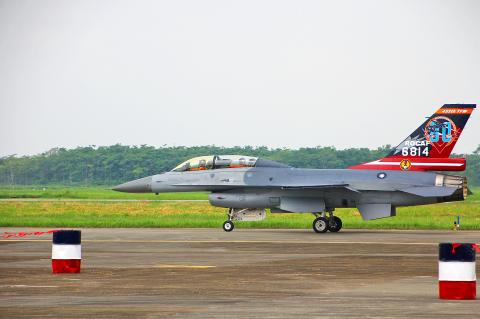The Ministry of National Defense is to increase the budget to upgrade the air force’s F-16 warplane fleet from NT$129.6 billion to NT$140.2 billion (US$4.21 billion to US$4.56 billion), a high-ranking defense official said yesterday.
Most of the budget increase aims to boost the number and types of air-to-air missiles the aircraft can carry, said the official, who declined to be named.
Better missiles are necessary to maintain parity between the upgraded F-16s and the Chinese People’s Liberation Army Air Force’s tactical fighters, the official said.

Photo: Lin Yi-chang, Taipei Times
Details of the missile portion of the budget would be disclosed to lawmakers on the Foreign Affairs and National Defense Committee when the Legislative Yuan reviews the national defense budget for fiscal 2019, the official said.
After the fatal crash of an F-16 piloted by major Wu Yen-ting (吳彥霆) during the annual Han Kuang military exercises in June, the military has decided to install the latest version of the automated ground collision avoidance system, which would also be covered by the additional funding, they said.
The system, which has been installed in the US Air Force’s F-16 fleet, enables the aircraft to pull up before crashing into the ground independently of pilot input, which is advantageous in instances where a pilot has been incapacitated or otherwise fails to take action to avoid controlled flight into terrain, they added.
The Republic of China Air Force’s standard-issue equipment for that purpose is the equivalent of the enhanced ground proximity warning system utilized by civilian airliners, the official said.
The proximity warning system is designed to emit an audio warning to the pilot when an aircraft is dangerously close to the ground, but it is not capable of taking action independently of the pilot, they said.
The US government has agreed to supply the armaments and equipment identified in the budget, while an earlier scheme for F-16V performance improvement packages — which is to be completed by 2023 — is to be followed as planned, the official said.

US President Donald Trump yesterday announced sweeping "reciprocal tariffs" on US trading partners, including a 32 percent tax on goods from Taiwan that is set to take effect on Wednesday. At a Rose Garden event, Trump declared a 10 percent baseline tax on imports from all countries, with the White House saying it would take effect on Saturday. Countries with larger trade surpluses with the US would face higher duties beginning on Wednesday, including Taiwan (32 percent), China (34 percent), Japan (24 percent), South Korea (25 percent), Vietnam (46 percent) and Thailand (36 percent). Canada and Mexico, the two largest US trading

AIR SUPPORT: The Ministry of National Defense thanked the US for the delivery, adding that it was an indicator of the White House’s commitment to the Taiwan Relations Act Deputy Minister of National Defense Po Horng-huei (柏鴻輝) and Representative to the US Alexander Yui on Friday attended a delivery ceremony for the first of Taiwan’s long-awaited 66 F-16C/D Block 70 jets at a Lockheed Martin Corp factory in Greenville, South Carolina. “We are so proud to be the global home of the F-16 and to support Taiwan’s air defense capabilities,” US Representative William Timmons wrote on X, alongside a photograph of Taiwanese and US officials at the event. The F-16C/D Block 70 jets Taiwan ordered have the same capabilities as aircraft that had been upgraded to F-16Vs. The batch of Lockheed Martin

GRIDLOCK: The National Fire Agency’s Special Search and Rescue team is on standby to travel to the countries to help out with the rescue effort A powerful earthquake rocked Myanmar and neighboring Thailand yesterday, killing at least three people in Bangkok and burying dozens when a high-rise building under construction collapsed. Footage shared on social media from Myanmar’s second-largest city showed widespread destruction, raising fears that many were trapped under the rubble or killed. The magnitude 7.7 earthquake, with an epicenter near Mandalay in Myanmar, struck at midday and was followed by a strong magnitude 6.4 aftershock. The extent of death, injury and destruction — especially in Myanmar, which is embroiled in a civil war and where information is tightly controlled at the best of times —

China's military today said it began joint army, navy and rocket force exercises around Taiwan to "serve as a stern warning and powerful deterrent against Taiwanese independence," calling President William Lai (賴清德) a "parasite." The exercises come after Lai called Beijing a "foreign hostile force" last month. More than 10 Chinese military ships approached close to Taiwan's 24 nautical mile (44.4km) contiguous zone this morning and Taiwan sent its own warships to respond, two senior Taiwanese officials said. Taiwan has not yet detected any live fire by the Chinese military so far, one of the officials said. The drills took place after US Secretary